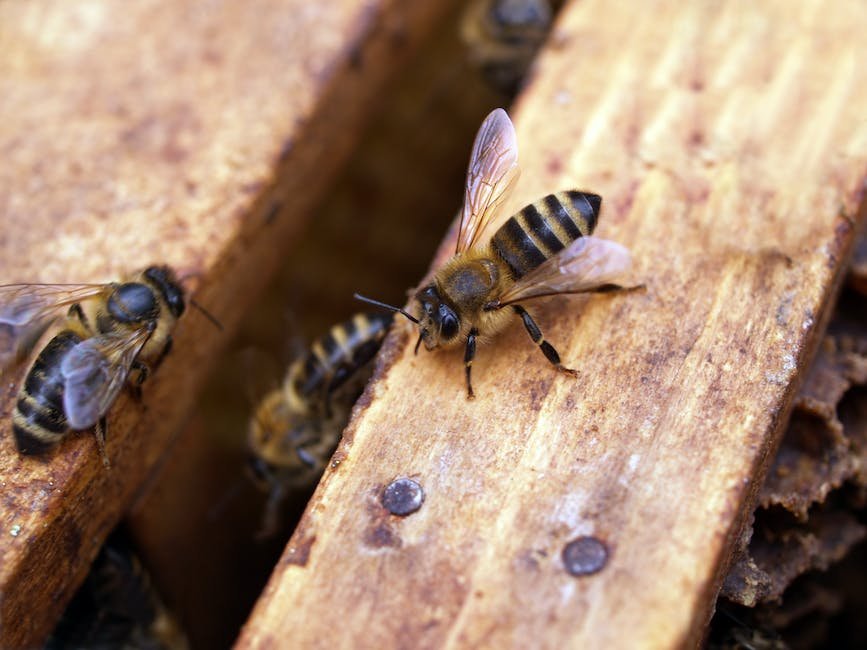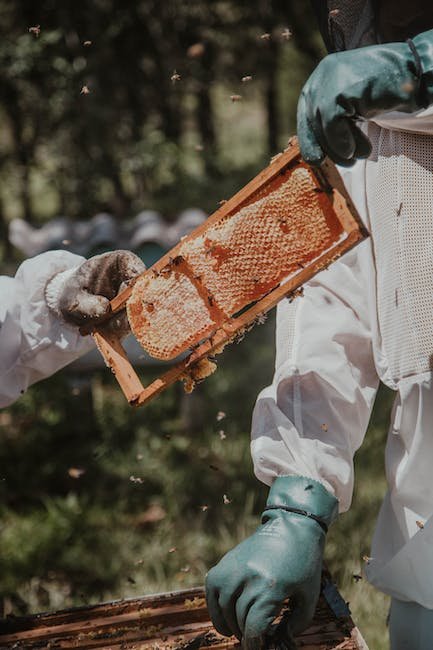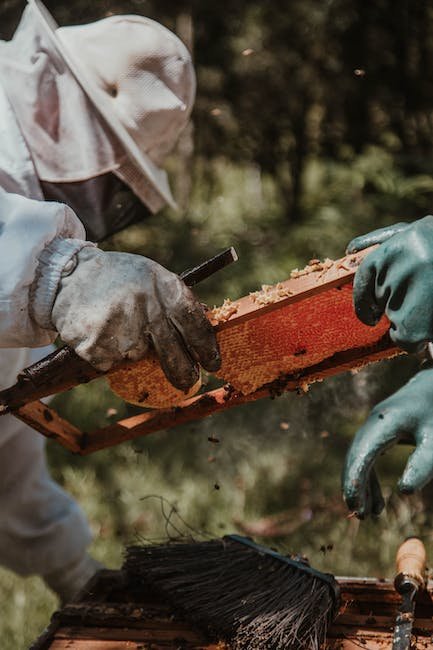Bees, with their vibrant buzzing and delicate wings, have long been celebrated as nature’s diligent workers. Beyond their role in pollination and honey production, bees contribute significantly to economic development worldwide. The art of beekeeping, practiced for centuries, has not only provided sustenance and sweetness to human lives but has also become a fundamental pillar of economies. Uniting the realms of ecology and commerce, beekeeping holds the key to sustainable growth, fostering biodiversity, supporting livelihoods, and driving innovation. As we delve into the intricacies of this enchanting craft, we unravel a world where bees are esteemed for more than just their golden nectar, and realize the profound importance of beekeeping in shaping economic landscapes across the globe.
Table of Contents
- The Relationship between Beekeeping and Economic Growth: A Comprehensive Overview
- Boosting Local Economies: How Beekeeping Contributes to Sustainable Development
- Unlocking the Potential of Beekeeping: Key Strategies for Economic Empowerment
- Safeguarding Biodiversity and Securing Livelihoods: The Role of Beekeeping
- Building a Thriving Beekeeping Industry: Essential Steps for Economic Advancement
- Q&A
- In Retrospect

The Relationship between Beekeeping and Economic Growth: A Comprehensive Overview
Beekeeping, often overlooked as an essential industry, plays a vital role in driving economic growth on both local and global scales. This intricate relationship between beekeeping and economics encompasses various aspects, from honey production to pollination services. By harnessing the natural abilities of bees, a multitude of economic opportunities arise, bolstering agricultural sectors, creating employment, and fostering sustainable development.
Let us delve into some key factors that highlight the significance of beekeeping in fostering economic growth:
- Pollination services: Bees, as diligent pollinators, contribute significantly to the reproduction of countless fruit, vegetable, and flower crops. This pollination process enhances crop yield and quality, thus strengthening agricultural economies and fostering innovation in farming practices.
- Honey production: A delicious byproduct of beekeeping, honey has become a valuable commodity. The production, processing, and trade of honey create employment opportunities and generate revenue for both beekeepers and related industries. Additionally, honey and its derivatives find applications in various sectors, such as food, medicine, and cosmetics.
- Wax and propolis: Beyond honey, bees also produce beeswax and propolis. Beeswax finds its way into an extensive range of products, including candles, cosmetics, and pharmaceuticals, providing economic avenues for different industries. On the other hand, propolis, with its medicinal properties, contributes to the pharmaceutical and health sectors.
- Beekeeping equipment and services: The growth of the beekeeping industry has nurtured the development of a wide array of specialized equipment, ranging from hives and frames to protective gear for beekeepers. Additionally, the demand for educational programs, hive maintenance services, and pollination contracts creates employment opportunities and stimulates economic growth within associated sectors.
This comprehensive overview merely scratches the surface of the intricate relationship between beekeeping and economic growth. As a fundamental element in the ecosystem, bees offer not only their invaluable contributions to natural systems but also drive economic opportunities that shape industries, generate income, and pave the way for sustainable development.

Boosting Local Economies: How Beekeeping Contributes to Sustainable Development
Beekeeping not only plays a vital role in the preservation of the environment but also provides a significant boost to local economies. Harnessing the power of nature’s tiny pollinators, beekeeping fosters sustainable development in several ways.
- Job Creation: Beekeeping offers employment opportunities for communities, creating much-needed jobs. From tending to the hives to honey production and packaging, each step of the process generates employment.
- Enhanced Agricultural Practices: The pollination services provided by bees help increase crop yields, leading to improved agricultural practices. This, in turn, supports local farmers by providing them with better harvests and enhanced income.
- Income Diversification: Beekeeping allows individuals to diversify their income sources. Local beekeepers can sell not only honey but also beeswax, pollen, propolis, and royal jelly, providing them with additional revenue streams.
Moreover, beekeeping promotes sustainable development by preserving biodiversity, as bees play a crucial role in maintaining the ecological balance. Through their tireless efforts, not only do they support the growth of flowers and plants, but they also contribute to a healthier ecosystem overall. Harnessing the potential of beekeeping is not only an investment in the environment but also an investment in the sustainable development of local economies.

Unlocking the Potential of Beekeeping: Key Strategies for Economic Empowerment
Beekeeping, often overlooked as a small-scale business, possesses immense economic potential for empowerment and sustainable livelihoods. Understanding the key strategies can help beekeepers harness this potential and create a thriving business. Here are some crucial strategies to unlock the full economic benefits of beekeeping:
- Investing in Education and Training: Knowledge is power, and in beekeeping, it is the key to success. Providing beekeepers with comprehensive education and training programs equips them with the skills and techniques needed to maximize honey production, maintain healthy colonies, and safely extract quality honey.
- Fostering Collaborative Networks: Bees thrive in diverse ecosystems, and so do beekeepers. Establishing networks and fostering collaboration among beekeepers not only promotes knowledge exchange but also enables bulk purchasing of equipment and supplies, reducing costs. Through these networks, beekeepers can jointly market their honey products and negotiate better deals with wholesalers and retailers.
- Investing in Quality Infrastructure and Technology: Modern beekeeping techniques and technologies, such as hive monitoring systems and honey processing equipment, can significantly improve productivity and enhance honey quality while reducing labor costs. Investing in state-of-the-art infrastructure and technology enables beekeepers to streamline their operations and meet market demands efficiently.
By implementing these key strategies, aspiring beekeepers can transform their passion for bees into a thriving economic enterprise. Unlocking the potential of beekeeping not only uplifts individuals and communities but also contributes to the preservation of our environment and biodiversity.
Safeguarding Biodiversity and Securing Livelihoods: The Role of Beekeeping
Bees are often considered a small insect with an extraordinary impact on our planet, playing a vital role in safeguarding biodiversity and securing livelihoods. The art of beekeeping, or apiculture, has a long history dating back centuries and has proven invaluable in preserving both the delicate balance of ecosystems and the economic stability of communities around the world.
One of the primary benefits of beekeeping lies in the pollination services provided by honeybees. As they flit from flower to flower collecting nectar, these industrious insects inadvertently transfer pollen, enabling the fertilization process to occur. This symbiotic relationship between bees and plants ensures the reproduction of countless species, including those crucial for food production such as fruits, vegetables, and nuts. Additionally, for plants that rely solely on insect pollination, like almonds or blueberries, the role of bees becomes even more crucial.
Beekeeping also offers numerous economic opportunities for communities, fostering local businesses and generating sustainable livelihoods. Honey, the most well-known bee product, has been a staple in human culture for centuries. Besides honey production, other bee by-products such as beeswax, propolis, and royal jelly have various pharmaceutical, cosmetic, and nutritional applications, creating additional revenue streams. Moreover, the act of beekeeping itself provides employment and entrepreneurial prospects for individuals interested in harnessing the natural benefits of these incredible creatures.
Building a Thriving Beekeeping Industry: Essential Steps for Economic Advancement
Ever wondered how bees play an essential role in our environment and economy? Building a thriving beekeeping industry is not only beneficial for the bees but also for economic advancement. Here are some essential steps to consider for those looking to start their journey in beekeeping:
- Education and Training: Acquiring knowledge about bees, their behavior, and the techniques of beekeeping is crucial. Attend workshops, seminars, and courses to gain expertise in beekeeping practices.
- Investing in Quality Equipment: Beekeeping requires certain tools and equipment to ensure the safety and productivity of both the bees and the beekeeper. Investing in quality hives, frames, protective gear, and other necessary tools is vital.
- Choosing the Right Location: Bees thrive in specific environments, so selecting an ideal location for your beekeeping operation is paramount. Consider factors like availability of natural nectar sources, access to water, and protection from pesticides.
- Collaboration and Networking: Connect with fellow beekeepers, local associations, and organizations dedicated to beekeeping. Collaborating and sharing knowledge will help you stay updated with the latest industry trends and techniques.
- Implementing Sustainable Practices: Emphasize sustainable beekeeping practices that prioritize the well-being of bees and the environment. Consider using organic methods, minimizing chemical treatments, and promoting biodiversity around your apiaries.
- Marketing and Selling Honey Products: Once your apiary is established and honey production begins, market your honey and other bee-related products to maximize your economic returns. Utilize online platforms, local markets, and establish partnerships with retailers for wider reach.
By following these essential steps, you can contribute to building a thriving beekeeping industry while also enjoying the sweet rewards of honey production and economic advancement.
Q&A
Why is beekeeping important for economic development?
Beekeeping is crucial for economic development as it provides various income-generating opportunities. Bee products such as honey, beeswax, propolis, and pollen have a high market value, contributing significantly to the local economy.
How does beekeeping benefit local communities?
Beekeeping plays a vital role in the economic empowerment of local communities. It creates jobs, especially in rural areas, where beekeepers can earn income through honey production, beekeeping equipment manufacturing, and pollination services.
What role does beekeeping play in promoting sustainable agriculture?
Beekeeping is essential for sustainable agriculture as bees play a crucial role in pollination. Through their pollination services, bees enhance crop yield and quality, ensuring a diverse and healthy food supply while reducing the dependency on chemical fertilizers.
How does beekeeping contribute to the environment?
Beekeeping supports biodiversity conservation and ecological balance by promoting the propagation of flowering plants through pollination. It also indirectly contributes to the process of reforestation and helps maintain vibrant ecosystems.
What are some challenges faced by beekeepers in economic development?
Beekeepers face various challenges, such as pests and diseases affecting bee colonies, habitat loss due to urbanization, climate change impacting flower availability, and limited infrastructure and technical support. Overcoming these challenges requires government support and awareness among the public.
What measures can be taken to promote beekeeping for economic development?
To promote beekeeping, governments can provide training programs, financial incentives, and subsidized equipment to encourage people to enter the beekeeping industry. Awareness campaigns, educational initiatives, and the establishment of beekeeping cooperatives can also support economic development through beekeeping.
In Retrospect
As we bid farewell to the buzzing world of beekeeping and its pivotal role in economic development, we are left in awe of the humble honeybee and its magnificent impact. From the intricate dance of pollination to the golden elixir of honey, these wondrous creatures have not only carved their place in the natural world but have shaped the course of our economic growth.
Through the lens of this extraordinary partnership between bees and humans, we have witnessed the power of unity and collaboration. By nurturing and caring for these delicate insects, we have unlocked the doors to countless realms of possibilities, transforming fields into bountiful havens of productivity and economies into thriving landscapes.
As our global markets become increasingly intertwined, beekeeping emerges as an antidote to economic stagnation and a symbol of sustainable progress. Across the world, nations have awakened to the immense potential lying within the gentle hum of bees and their unwavering dedication to ensuring the survival of our ecosystems.
Never before has it been clearer that the well-being of honeybees and economic prosperity go hand in hand. The financial benefits derived from honey production alone are remarkable, generating jobs, income, and export revenue for countless communities. Beyond honey, of course, lies the silent hero of pollination – a service worth billions of dollars that fuels the growth of agricultural sectors, invigorates fragile ecosystems, and secures food security for millions.
But the beauty of beekeeping stretches far beyond the financial rewards it bestows upon us. It lies within the tapestry of connections it weaves, bridging divide and fostering unity. It inspires a sense of stewardship towards the natural world and reminds us of our inherit responsibility to protect and nurture it. It sparks innovation and creativity as we seek sustainable solutions to the challenges facing our planet.
As we conclude this exploration and bid adieu to the proposition that bees are essential to economic development, we are reminded that the significance of beekeeping reaches far beyond mere numbers or profits. It represents a shared commitment to a greener future, a testament to the resilience of nature and our own resilience as a species.
So let us remember, as we walk away from this journey, to carry the wisdom of the honeybee within our hearts and minds. Let us nurture the economic potential that lies within their delicate wings and spread the sweet nectar of prosperity to all corners of the globe. For when nature and economics converge, not only the bees but also humanity can thrive in harmony, forever connected by the intricate dance of life itself.
As an affiliate, my content may feature links to products I personally use and recommend. By taking action, like subscribing or making a purchase, you’ll be supporting my work and fueling my taco cravings at the same time. Win-win, right?
Want to read more? Check out our Affiliate Disclosure page.